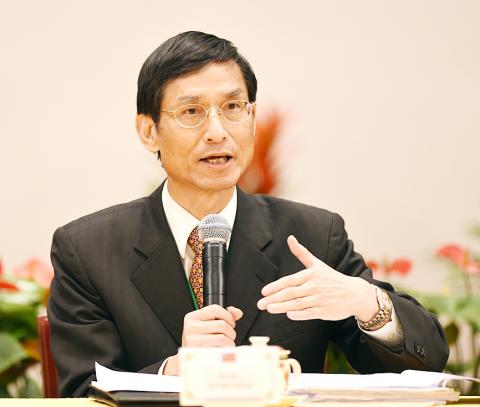While plans are under way to phase out the 18 percent preferential saving rate for retired public employees, those who receive a monthly pension of less than NT$32,160 are likely to still be entitled to the benefit.
The Presidential Office’s Pension Reform Committee is inclined to keep the 18 percent preferential savings rate for people whose pensions are below a certain amount, which is likely to be set at NT$32,160, Minister Without Portfolio Lin Wan-i (林萬億), the committee’s deputy convener, said yesterday.
The proposed floor is designed for retired civil servants and public-school teachers, but is also expected to be extended to retired military personnel, although an independent pension reform plan for military personnel has yet to be submitted.

Photo: Chien Jung-fong, Taipei Times
The committee chose NT$32,160 over a proposal of NT$25,000 as the pension floor to provide a basic living income for a greater number of less-well-off retirees, Lin said.
However, the final decision is to be announced by President Tsai Ing-wen (蔡英文) tomorrow, Lin said.
Following January’s national affairs conference on pension reform, the committee was leaning toward endorsing the NT$32,160 figure, as it is consistent with the majority public opinion, Lin said.
Fewer than 4,000 retired public employees receive a monthly pension of less than NT$32,160, and there are fewer than 2,000 who receive under NT$25,000.
“Both plans have minimal effects on pension fund spending. The NT$32,160 plan is more supportive of underprivileged people,” Lin said.
“The government should take care of underprivileged pensioners, who had relatively low incomes before retirement. From the perspective of protecting underprivileged people, the government is happy to adopt the NT$32,160 plan,” he said.
The committee has decided to continue to allow financially dependent family members of deceased pensioners to receive half the amount of the pension formerly paid to their relative.
The Executive Yuan and the Examination Yuan in 2013 proposed reducing the benefits paid to surviving family members from half of a deceased relative’s pension to one-third.
The proposal was never implemented and the committee has decided to keep the survivor’s benefit at one-half, to ensure a basic standard of living for widows and children, who make up the majority of people receiving it, Lin said.
The Executive Yuan and the Examination Yuan are on Thursday expected to approve a legislative package for pension reforms that is to be submitted to the Legislative Yuan.
The proposals are to include a draft amendment to the Labor Insurance Act (勞工保險條例), a draft bill on retirement benefits for public-school teachers, a draft bill on the retirement benefits for civil servants, a draft amendment to the Civil Servant and Teacher Insurance Act (公教人員保險法) and a draft amendment to the Act Governing the Recompense for the Discharge of Special Political Appointees (政務人員退職撫卹條例).

The CIA has a message for Chinese government officials worried about their place in Chinese President Xi Jinping’s (習近平) government: Come work with us. The agency released two Mandarin-language videos on social media on Thursday inviting disgruntled officials to contact the CIA. The recruitment videos posted on YouTube and X racked up more than 5 million views combined in their first day. The outreach comes as CIA Director John Ratcliffe has vowed to boost the agency’s use of intelligence from human sources and its focus on China, which has recently targeted US officials with its own espionage operations. The videos are “aimed at

STEADFAST FRIEND: The bills encourage increased Taiwan-US engagement and address China’s distortion of UN Resolution 2758 to isolate Taiwan internationally The Presidential Office yesterday thanked the US House of Representatives for unanimously passing two Taiwan-related bills highlighting its solid support for Taiwan’s democracy and global participation, and for deepening bilateral relations. One of the bills, the Taiwan Assurance Implementation Act, requires the US Department of State to periodically review its guidelines for engagement with Taiwan, and report to the US Congress on the guidelines and plans to lift self-imposed limitations on US-Taiwan engagement. The other bill is the Taiwan International Solidarity Act, which clarifies that UN Resolution 2758 does not address the issue of the representation of Taiwan or its people in

US Indo-Pacific Commander Admiral Samuel Paparo on Friday expressed concern over the rate at which China is diversifying its military exercises, the Financial Times (FT) reported on Saturday. “The rates of change on the depth and breadth of their exercises is the one non-linear effect that I’ve seen in the last year that wakes me up at night or keeps me up at night,” Paparo was quoted by FT as saying while attending the annual Sedona Forum at the McCain Institute in Arizona. Paparo also expressed concern over the speed with which China was expanding its military. While the US

SHIFT: Taiwan’s better-than-expected first-quarter GDP and signs of weakness in the US have driven global capital back to emerging markets, the central bank head said The central bank yesterday blamed market speculation for the steep rise in the local currency, and urged exporters and financial institutions to stay calm and stop panic sell-offs to avoid hurting their own profitability. The nation’s top monetary policymaker said that it would step in, if necessary, to maintain order and stability in the foreign exchange market. The remarks came as the NT dollar yesterday closed up NT$0.919 to NT$30.145 against the US dollar in Taipei trading, after rising as high as NT$29.59 in intraday trading. The local currency has surged 5.85 percent against the greenback over the past two sessions, central